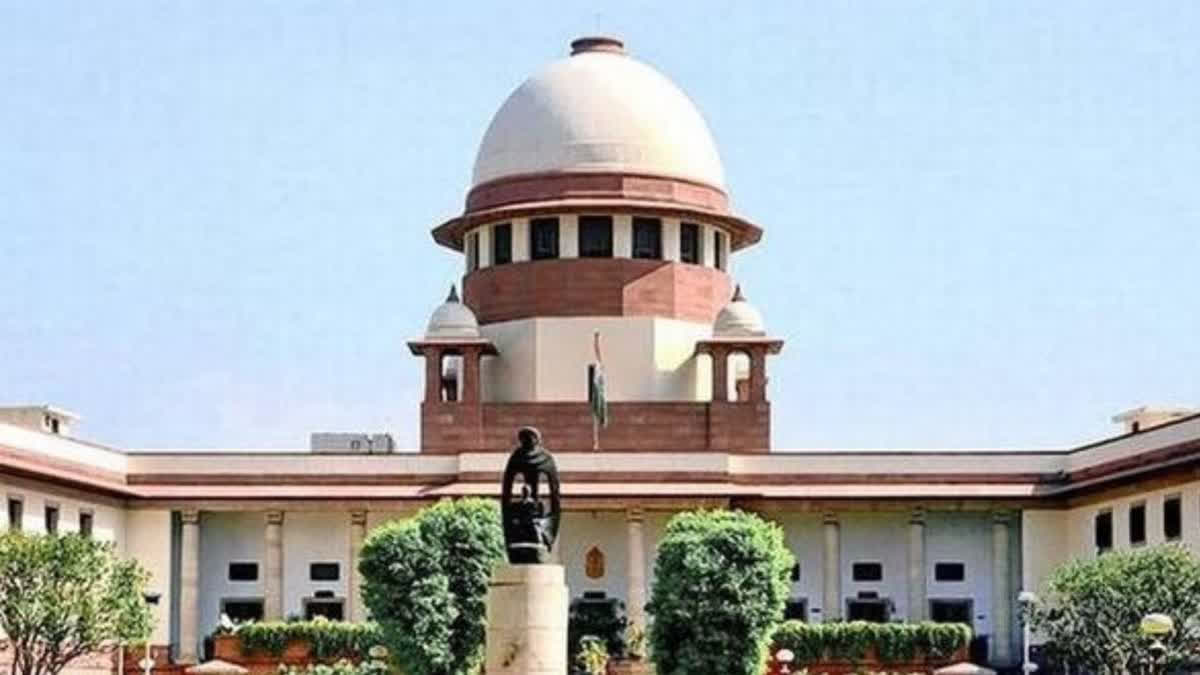New Delhi: The Supreme Court on Wednesday overturned a 1997 order of a seven-judge bench, which granted powers to the central government for regulation of industrial alcohol, saying that states have regulatory power over the production, manufacture and supply of industrial alcohol. Industrial alcohol is not meant for human consumption.
The seven-judge bench had ruled that the central government had the regulatory power over the production of industrial alcohol. In 2010, the matter was referred to the nine-judge bench. The case was first raised in a 1990 ruling. It has seen conflicting interpretations, before being referred to the nine-judge bench.
Chief Justice of India D Y Chandrachud, who authored the judgment for himself and seven other judges, said the Centre lacks the regulatory power. While eight of the nine judges on the constitution bench, including Chief Justice of India DY Chandrachud and Justices Hrishikesh Roy, Abhay S Oka, BV Nagarathna, J B Pardiwala, Manoj Misra, Ujjal Bhuyan, Satish Chandra Sharma and Augustine George Masih, backed the interpretation, Justice B V Nagarathna dissented.
The majority ruling said the meaning of intoxicating liquor under Entry 8 of List II (state list) is beyond the narrow definition of alcoholic beverages.
The CJI said that Entry 8 List II - includes both industrial and product of intoxicating liquor and the industrial alcohol under Entry 8 List II cannot be taken over by the Parliament under Entry 52 List I. "State's power cannot be taken away for making laws on intoxicating liquor”, said the majority judgment.
The CJI also made it clear that industrial liquor can be regulated under the term 'intoxicating liquor'. The judgment set aside the 1990 judgment in Synthetics & Chemicals Ltd vs State of Uttar Pradesh which held that “intoxicating liquor” refers only to potable alcohol and therefore, states cannot tax industrial alcohol.
Justice Nagarathna, in her dissenting opinion, said “industrial alcohol” means alcohol which is not fit for human consumption and that an artificial interpretation cannot be adopted to give a different meaning to the term ‘intoxicating liquor’ which is contrary to the intention of the constitution makers. The detailed judgment in the matter will be uploaded later in the day.
The apex court, in the majority judgment, said irrespective of whether the term 'industry' is interpreted in a narrow or a wide manner (a point that is vehemently contested by both sides), the industry of intoxicating liquor specified in Entry 8 cannot be taken over by Parliament under Entry 52 of List I.
The CJI, who authored the majority judgment, said the general principle is that legislative lists must be interpreted widely and the question that the court must pose is whether the two entries would overlap when interpreted widely.
"If they overlap, the court must reconcile them. But the method of reconciliation must maintain the federal balance. The courts must not apply the principle of legislative supremacy of Parliament at the stage of reconciliation…..such an exercise would tilt the federal balance towards the Union," said the CJI, in the 123-page judgment.
The bench said the only limitation in Entry 52 is that the control of the industry by the Union must be necessary for public interest and Parliament can legislate on any industry, provided that it satisfies the condition prescribed in the Entry.
"Thus, Entry 52 when read independent of any other entry of List I, List II and List III does not preclude the inclusion of the industry of intoxicating liquor, provided that the Union is able to prove that its control is necessary in the public interest," said the bench.
"Similarly, Entry 8 of List II, when read independently also includes, inter alia, the production and manufacture of intoxicating liquor which is included within the meaning of industry. Thus, Entry 52 of List I and Entry 8 of List II overlap on the aspect of 'industry' of intoxicating liquor," said the bench.
The CJI said Entry 8 of List II is not subject to Entry 52 of List I, thus the state legislature has the exclusive competence to enact a law on the field in Entry 8.
The apex court said Parliament does not have the legislative competence to enact a law taking control of the industry of intoxicating liquor under Entry 52 of List I.
The bench said it is clear from the analysis of the judgments in FN Balsara and Southern Pharmaceuticals case that the meaning of the phrase ‘intoxicating liquor’ in Entry 8 of List II has been expanded beyond the narrow definition of alcoholic beverages that produce an ‘intoxicating effect’ upon consumption.
The bench said Entry 8 of List II of the Seventh Schedule to the Constitution is both an industry-based entry and a product-based entry.
It added that the words that follow the expression "that is to say" in the Entry are not exhaustive of its contents and it includes the regulation of everything from the raw materials to the consumption of 'intoxicating liquor'.
"Parliament cannot occupy the field of the entire industry merely by issuing a declaration under Entry 52 of List I. The State Legislature’s competence under Entry 24 of List II is denuded only to the extent of the field covered by the law of Parliament under Entry 52 of List I," said the CJI.
The CJI said Parliament does not have the legislative competence to enact a law taking control of the industry of intoxicating liquor covered by Entry 8 of List II in the exercise of the power under Article 246 read with Entry 52 of List I.



